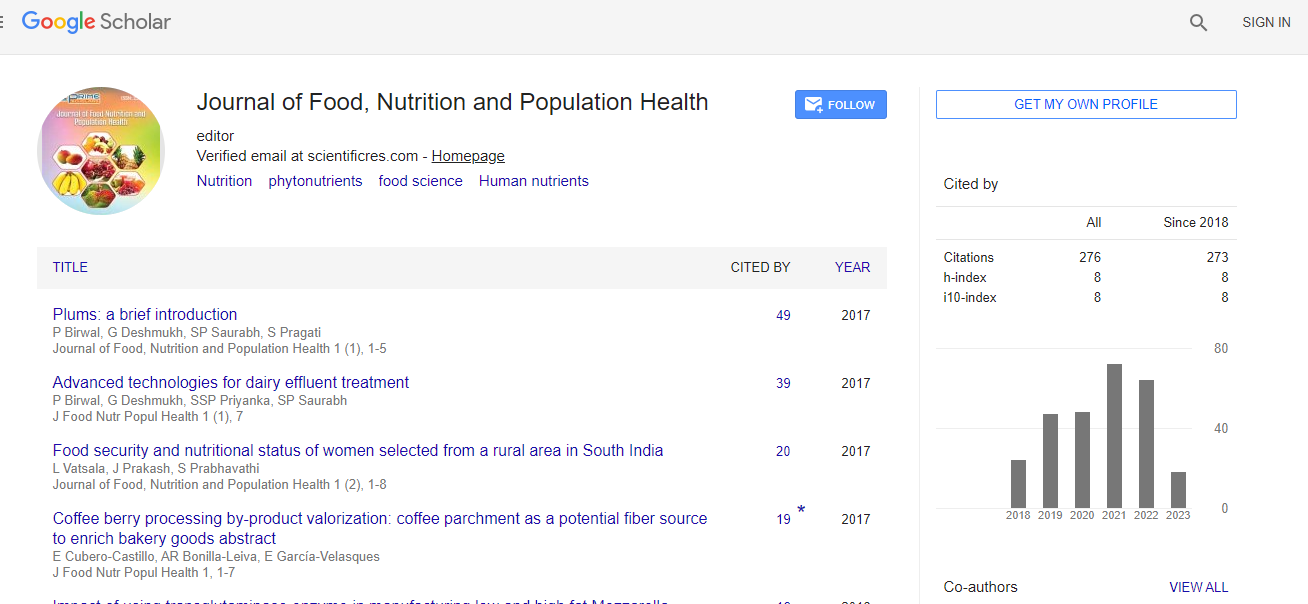Short Communication - (2024) Volume 8, Issue 3
The Role of Calcium-Rich Foods in Enhancing Bone Density and Strength
Ren Kato*
Department of Food and Nutrition, Nagoya University, Japan
*Correspondence:
Ren Kato,
Department of Food and Nutrition, Nagoya University,
Japan,
Email:
Received: 02-Sep-2024, Manuscript No. IPJFNPH-24-21225;
Editor assigned: 04-Sep-2024, Pre QC No. IPJFNPH-24-21225 (PQ);
Reviewed: 18-Sep-2024, QC No. IPJFNPH-24-21225;
Revised: 23-Sep-2024, Manuscript No. IPJFNPH-24-21225 (R);
Published:
30-Sep-2024, DOI: 10.21767/2577-0586.8.3.21
Introduction
Bone health is a critical aspect of overall wellness, yet it often
receives less attention compared to other health priorities.
Calcium, a mineral essential for maintaining bone density
and strength, plays a pivotal role in skeletal health. This
commentary explores the importance of calcium for bone
health, highlights key foods that are rich in calcium, and offers
practical advice on how to integrate these into your diet for
optimal bone support. During childhood and adolescence,
calcium is fundamental for bone growth and development.
Calcium is a crucial building block of bone tissue. It contributes
to bone density and strength, helping to maintain the structural
integrity of the skeletal system. Adequate calcium intake is vital
during childhood and adolescence, calcium is fundamental for
bone growth and development.
Description
In adulthood, calcium helps maintain bone density and strength,
reducing the risk of osteoporosis and fractures. Insufficient
calcium can lead to decreased bone density, increasing
susceptibility to osteoporosis, a condition characterized by
brittle and fragile bones. Strong bones are less prone to
fractures and injuries, making adequate calcium intake crucial
for overall skeletal health. One of the most well-known sources
of calcium, providing approximately 300 mg per cup. Hard
cheeses like cheddar and Swiss are rich in calcium, with around
200 mg per ounce. Incorporating calcium-rich foods into your
diet is an effective strategy for supporting bone health. Here
are some top sources of calcium. Yogurt contains about 300
mg-400 mg of calcium per serving, depending on the brand and
type. Almond, soy, and oat milks often have added calcium, with
approximately 300 mg per cup. Some brands are fortified with
calcium, providing around 300 mg per serving. Include a mix
of dairy products, leafy greens, fortified foods, and nuts in your
diet to ensure a consistent intake of calcium. Kale offers about
100 mg of calcium per cup when cooked. Essential for calcium
absorption, ensure adequate intake through sunlight exposure,
fortified foods, or supplements. Foods such as fatty fish,
fortified dairy, and egg yolks are good sources. These nutrients
also support bone health. Include foods rich in magnesium
(e.g., whole grains, nuts) and vitamin K (e.g., leafy greens) to
enhance bone strength. Aim for about 1,000 mg of calcium per
day for most adults, increasing to 1,200 mg for women over
50 and men over 70. Adjust based on individual health needs
and dietary guidelines. If dietary intake is insufficient, consult a
healthcare provider about supplements. Be mindful of dosage,
as excessive calcium can lead to health issues such as kidney
stones [1-4].
Conclusion
Maintaining strong bones requires a thoughtful approach to
nutrition, with calcium playing a central role. By incorporating
a variety of calcium-rich foods into your diet and ensuring
adequate intake of complementary nutrients like vitamin
D, you can support bone density and strength. A proactive
approach to bone health, including balanced nutrition and
lifestyle choices, is key to preserving skeletal integrity and
reducing the risk of bone-related disorders. As we age, these
dietary practices become even more critical in maintaining
overall health and quality of life.
Acknowledgement
None.
Conflict Of Interest
None.
References
- Lloyd K, McGregor J, John A, Craddock N, Walters JT, et al. (2015) A national population-based e-cohort of people with psychosis (PsyCymru) linking prospectively ascertained phenotypically rich and genetic data to routinely collected records: Overview, recruitment and linkage. Schizophrenia Res 166(1):131-136.
[Crossref] [Google Scholar]
- Delnord M, Szamotulska K, Hindori-Mohangoo AD, Blondel B, Macfarlane AJ, et al. (2016) Linking databases on perinatal health: A review of the literature and current practices in Europe. Eur J Pub Health 26(3):422-430.
[Crossref] [Google Scholar]
- Haneef R, Delnord M, Vernay M, Bauchet E, Gaidelyte R, et al. (2020) Innovative use of data sources: A cross-sectional study of data linkage and Artificial Intelligence practices across European countries. Arch Pub Health 78(1):55.
[Crossref] [Google Scholar]
- Bradley CJ, Penberthy L, Devers KJ, Holden DJ (2010) Health services research and data linkages: Issues, methods, and directions for the future. Health Serv Res 45:1468-1488.
[Crossref] [Google Scholar]
Citation: Kato R (2024) The Role of Calcium-rich Foods in Enhancing Bone Density and Strength. J Food Nutr Popul Health. 8:21.
Copyright: © 2024 Kato R. This is an open-access article distributed under the terms of the Creative Commons Attribution License, which permits unrestricted use, distribution, and reproduction in any medium, provided the original author and source are credited.

